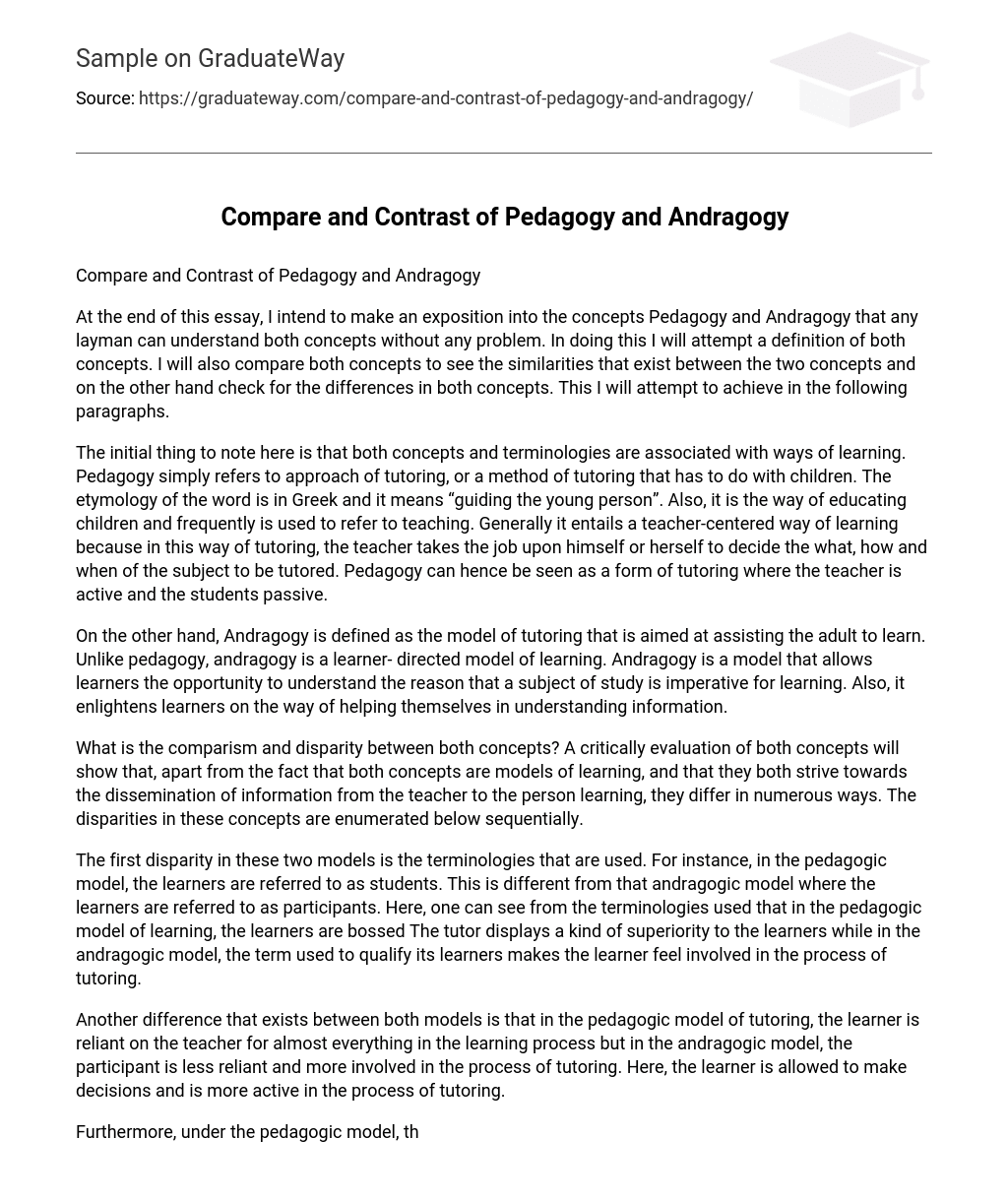At the end of this essay, I intend to provide an exposition on the concepts of Pedagogy and Andragogy that can be easily understood by any layman. To achieve this, I will define both concepts and compare them to identify their similarities and differences. This will be done in the following paragraphs.
The initial thing to note here is that both concepts and terminologies are associated with ways of learning. Pedagogy simply refers to the approach of tutoring or a method of tutoring that has to do with children. The etymology of the word is Greek, and it means “guiding the young person.” It is also the way of educating children and frequently used to refer to teaching. Generally, it entails a teacher-centered way of learning because in this way of tutoring, the teacher takes on the responsibility for deciding what, how, and when subjects are taught. Therefore, pedagogy can be seen as a form of tutoring where teachers are active and students are passive.
On the other hand, Andragogy is defined as a model of tutoring aimed at assisting adults in learning. Unlike pedagogy, andragogy is a learner-directed model of learning that allows learners to understand why a subject of study is essential for learning. It also enlightens learners on how to help themselves understand information.
What is the comparison and disparity between both concepts? A critical evaluation of both concepts will show that, apart from the fact that they are models of learning and strive towards disseminating information from the teacher to the learner, they differ in numerous ways. The disparities between these concepts are enumerated below:
The first disparity between these two models is the terminology used. In the pedagogic model, learners are referred to as students, whereas in the andragogic model, they are referred to as participants. The use of these terms highlights that in the pedagogic model, learners are subordinate to their teachers. The teacher assumes a position of superiority over their students. In contrast, in the andragogic model, the term participant” implies that learners are actively involved in their education.
Another difference between the two models is that in the pedagogic model of tutoring, the learner relies on the teacher for almost everything in the learning process. However, in the andragogic model, participants are less reliant and more involved in tutoring. Learners are allowed to make decisions and be more active in their learning process.
Furthermore, the pedagogic model operates under the general belief that students are naive and have little to contribute to the subject being taught. The expectation is for students to sit and listen as teachers impart information. However, this is not the case in the andragogic model of learning. In this system, teachers allow room for comments, additions, and subtractions based on the view that learners are intelligent but require guidance to bring out their intelligence.
In the pedagogic model of tutoring, the objectives of the tutoring process are fixed and rigid, and they are not open to consultation with the student. However, in the andragogic model of learning, the objectives of what is to be learned are less rigid and can be open to consultation. In this model, participants can propose amendments to be made in the tutoring process, which will be considered.
Another thing worth noting is that in the pedagogic model of learning, the teacher is in charge and decides the pace and timing of tutoring. This is not the case in the andragogic model, where tutoring is directed towards the learner. Here, tutors adjust to a tempo that satisfies participants. The workload on learners isn’t too much because tutors don’t rush them.
Additionally, in the pedagogical model of tutoring, all credit for the information goes solely to the teacher or tutor as students contribute little or nothing to the derived information. However, in a participatory model, participants are credited for the information obtained from the tutoring process because they are allowed to contribute their knowledge and experience. The role of the tutor is simply to guide and facilitate this process.
If you ask me, I believe that our educational system is overly focused on the pedagogical model of learning. Unfortunately, this model has deeply infiltrated our educational system. Often times, students fail to retain what they have learned from one year to the next. This is because the system encourages students to simply memorize information in order to pass exams. In my opinion, this type of learning is not true education; it’s just schooling. The pedagogical model has watered down our educational system because there’s no point in learning something that will be forgotten within a year. This happens because information learned through this method is only temporarily stored in memory due to the lack of participation and quick pace of teaching associated with it. Therefore, I conclude that if we truly want to be educated individuals, we need to do things differently and take a more active role in our own learning.
Reference:
Pedagogy comes from the Greek word paid,” meaning “child,” and “agogus,” meaning “leader of.” (Malcolm Knowles, 1998). In his book, The Adult Learner: The Definitive Classic in Adult Education and Human Resource Development, Knowles explores the concept of adult education.
John Dewey tested and proved his theories in the Laboratory School, which was established at the University of Chicago in 1896.
Eduard C. Lindeman wrote The Meaning of Adult Education” in 1926, which was published in New York by New Republic. It was later redistributed in 1989.
Conner, M. L. (1997-2004). Andragogy and Pedagogy.” Ageless Learner. Retrieved from http://agelesslearner.com/intros/andragogy.html.
Kidd, J. R. (1978). How Adults Learn (3rd ed.). Englewood Cliffs, NJ: Prentice Hall Regents.
Smith, M. K. (1996; 1999) wrote about ‘Andragogy’ in the encyclopedia of informal education, which can be found at http://www.infed.org/lifelonglearning/b-andra.htm. The last update is not specified.
Boud, D. et al. (1985). Reflection: Turning experience into learning. London: Kogan Page.





